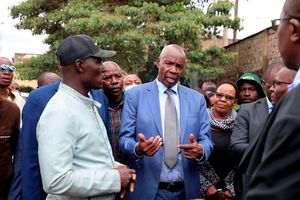Kisumu plans to exploit shores of Lake Victoria

An aerial view of Kisumu City centre. PHOTO | FILE | NATION MEDIA GROUP
Kisumu will get a major facelift if a proposed plan to be tabled in the county assembly in January is passed. The Kisumu Integrated Strategic Urban Development Plan (ISUDP) will remodel the town to international standards, with family leisure and tourism planned for its massive but currently idle lake shore.
Unlike other towns with waterfronts, Kisumu, has not benefited much from its location on the shores of Lake Victoria. Its disorderly development dates back to the colonial days, when efforts to plan it proved largely ineffective.
According to the draft seen by DN2, the land currently owned by a parastatal and private investors will be reclaimed for a big family park, with a road connecting it to the Jomo Kenyatta Sports Ground.
Also occupying prime land is the port, which is as old as the railway system. The portion it occupies has the potential to serve other activities such as tourism, according to the plan.
“The shore area needs special treatment. It should remain mostly unbuilt, allow through north-south circulation for pedestrians and bikes, and be developed as a high-quality public space; the location and construction of new piers should be part of the design and landscaping approach for the shore,” says the plan.
The proposed pathway will connect the park to the Impala Wildlife Sanctuary, almost a kilometre away
“The lake-bordering land is of high environmental value and is targeted for recreation, leisure and tourism and biodiversity,” the plan adds.
Consequently, the lake shore will have cafés, restaurants and family pathways. The adjacent water will feature activities such as boating and water sports.
The move comes at a time when the county has hinted at the introduction of floating restaurants to tap into the growing domestic and international tourism. The past few years have seen hospitality facilities in the town improve, with hotels recording full bookings.
In the new plan, all areas originally reserved for social activities will be reclaimed. Oile Market, which has for the past 20 years been a source of income for many families and government revenue, has been reclaimed and is currently cordoned off; it is being renovated into a park, as originally intended.
New markets have been earmarked for construction and existing ones improved. The plan aims to turn Kisumu into a true 24-hour economy, and also to reconnect the city with the lake to make the town a veritable lakeside town.
The land owned by the railways corporation falls within the central business district and is part of five lake-bordering special planning areas (SPAs) targeted for restructuring.
The plan says the corporation land has acted as a buffer between the city and the lake, making access to the shore from the town centre impossible. In addition, it has dictated the design of the road network by acting as the city’s limit.
“The value and potential of such areas deserves to be protected and leveraged through specific zoning and development guidance,” the plan states.
It will also create economic zones, upgrade slum areas into satellite cities, rehabilitate the lake front and replan certain areas.
Other objectives of the Agence Française de Développement funded plan are: to enhance living conditions of the Kisumu population by introducing comprehensive solid waste management, slum upgrading, commercial services and markets, public facilities and infrastructures.
The plan will however reserve the old downtown untouched for historic evidence of progress.
“The vast land bordering the lake will be put to economic use in an effort to restructure Kisumu in tandem with city status requirements,” the head of city planning, Ms Evelyne Otieno said.
And the county’s planning executive, Mr Vincent Kodera, the county government and and the Kenya Railways Corporation are holding talks to facilitate the restructuring of the city to make it face the lake. The corporation and private investors own most of the land on the lake front.
The programme will be implemented over 30 years.
During the public participation forums, residents demanded that the plan create and sustain the town’s strong economic footing and competitiveness within the region, support a thriving business community, improve present and future affordable housing and create and increase jobs to enhance their quality of life.
Over the years, Kisumu has expanded into a commercial hub, but uncontrolled development in response to a rapidly increasing population and investments saw the city expand without plan.
This has seen critics argue that it does not deserve the city status granted to it, albeit unofficially, by former President Daniel arap Moi.




